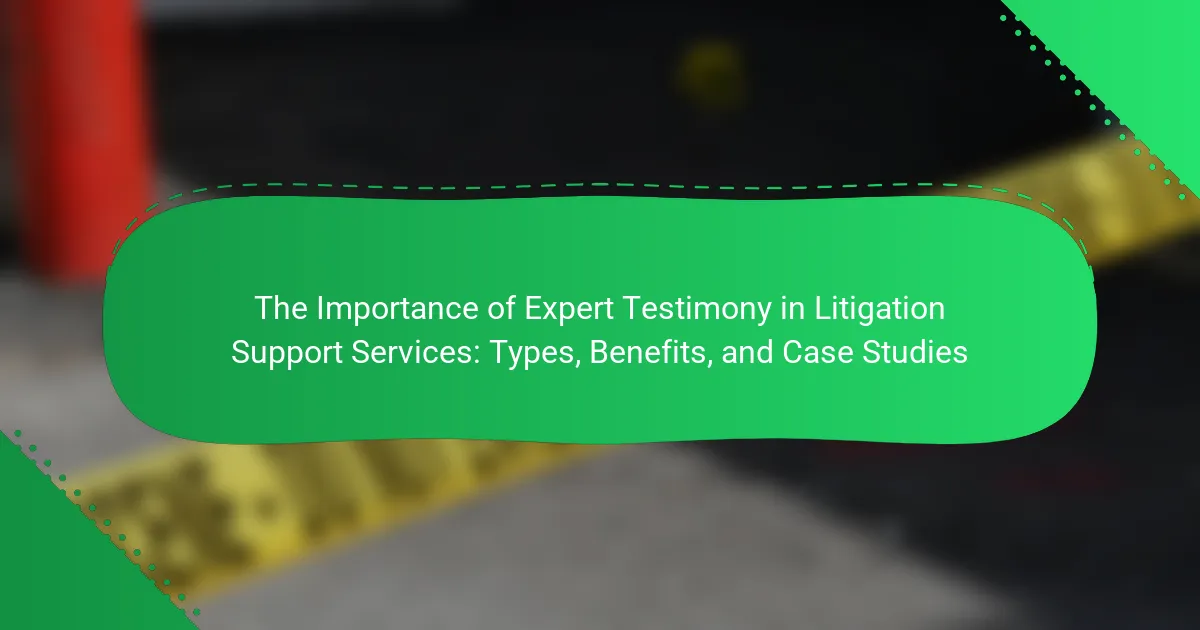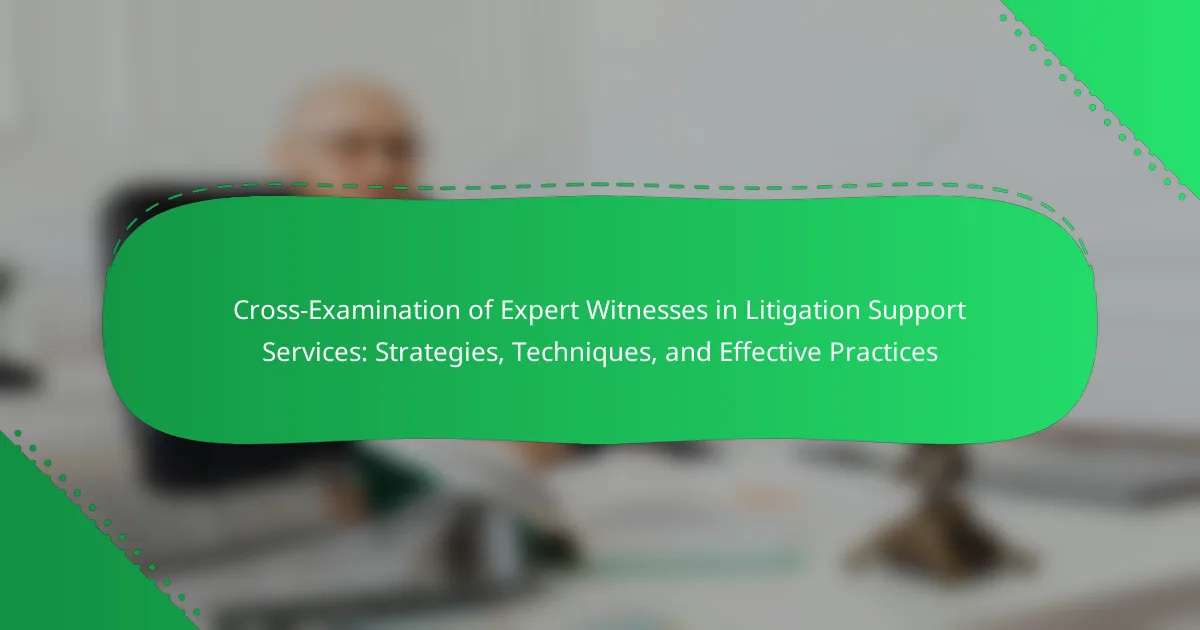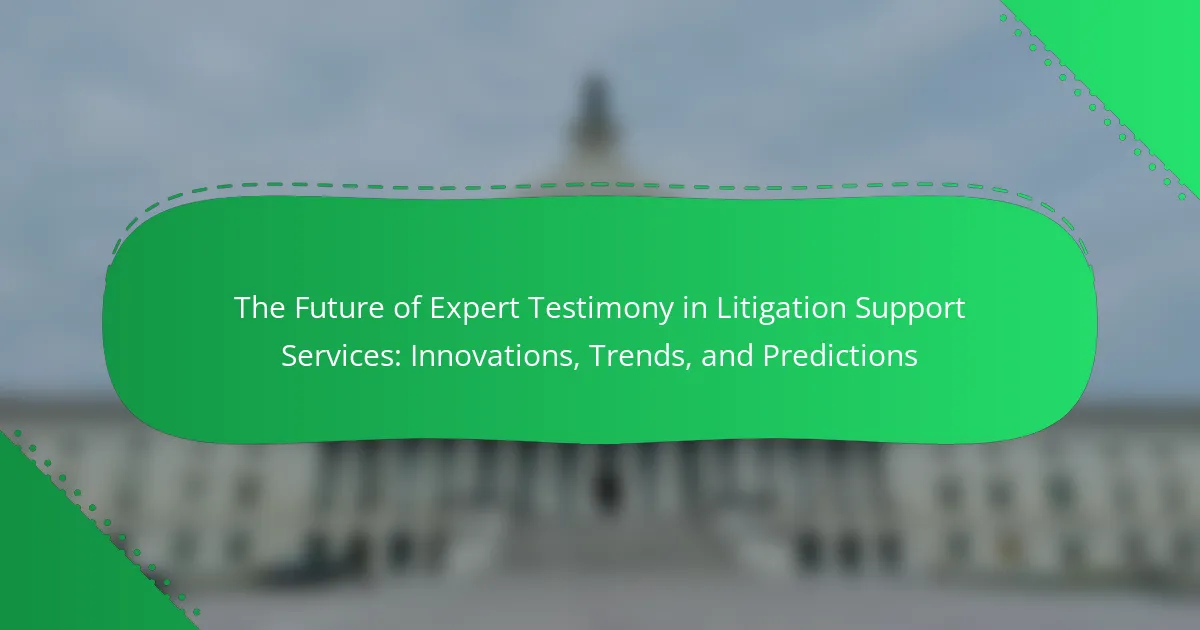Expert testimony in litigation support services plays a crucial role in legal cases by providing specialized opinions from qualified individuals. These expert witnesses analyze evidence and offer insights that help clarify complex subjects for judges and juries, thereby influencing case outcomes. Their qualifications often include advanced degrees and extensive experience in relevant fields, such as medicine and engineering. The credibility and reliability of expert testimony are critical, as research indicates that cases featuring expert witnesses can significantly increase the likelihood of favorable verdicts. This article will explore the key qualifications, roles, and impacts of expert testimony in the litigation process.

What is Expert Testimony in Litigation Support Services?
Expert testimony in litigation support services refers to specialized opinions provided by qualified individuals in legal cases. These experts analyze evidence and offer insights based on their expertise. Their testimony can clarify complex subjects for judges and juries. Expert witnesses often hold advanced degrees or have significant experience in their field. They may be called upon in various cases, including medical malpractice or engineering disputes. The credibility of expert testimony can significantly influence case outcomes. Courts often evaluate the qualifications of these experts to ensure reliability.
How does expert testimony contribute to litigation support?
Expert testimony contributes to litigation support by providing specialized knowledge that aids in understanding complex issues. Experts analyze evidence and present findings in a clear manner. Their insights can clarify technical details for judges and juries. This understanding can significantly influence case outcomes. For instance, expert testimony in medical malpractice cases can establish standards of care. Additionally, experts can help validate methodologies used in investigations. Their credibility often enhances the persuasiveness of arguments. Courts rely on expert testimony to ensure informed decision-making in litigation.
What are the primary functions of expert witnesses in legal cases?
Expert witnesses provide specialized knowledge to assist in legal cases. Their primary functions include offering expert opinions based on their expertise. They analyze evidence and present findings in a clear manner. Expert witnesses also educate the court about complex subjects. They may testify in court to support their opinions. Their insights can influence case outcomes significantly. Legal professionals rely on expert witnesses to clarify technical details. This reliance ensures informed decision-making in the judicial process.
How does expert testimony differ from other types of evidence?
Expert testimony differs from other types of evidence in that it provides specialized knowledge or opinions based on expertise. Unlike lay testimony, which is based on personal experience, expert testimony relies on scientific, technical, or professional insights. This type of evidence is often admissible to clarify complex issues for the court. Experts typically have qualifications, such as advanced degrees or certifications, that validate their authority. Their opinions can influence the outcome of a case by helping juries understand intricate subjects. For example, forensic experts may explain DNA evidence, which is beyond the grasp of average jurors. This distinction is crucial in legal proceedings, as it ensures that the evidence presented is reliable and relevant to the case at hand.
What key qualifications are necessary for expert witnesses?
Expert witnesses must possess specialized knowledge, education, and experience in their field. This expertise allows them to provide credible testimony in legal proceedings. A relevant advanced degree is often required to establish authority. Additionally, practical experience in the specific area of testimony is crucial. Certifications from recognized professional organizations can further validate their qualifications. Clear communication skills are essential for conveying complex information effectively. Previous experience in giving testimony can enhance their credibility in court. These qualifications ensure that expert witnesses can assist the court in understanding technical matters.
What educational background is typically required for expert witnesses?
Expert witnesses typically require advanced degrees in their area of expertise. Common educational backgrounds include fields such as medicine, engineering, law, and finance. Many expert witnesses hold a master’s degree or a doctorate. Professional certifications may also enhance their credibility. Experience in their specific field is crucial. This combination of education and experience establishes their authority. Courts often rely on this background to assess qualifications. Expert witnesses must demonstrate specialized knowledge relevant to the case at hand.
How do certifications and professional experience enhance credibility?
Certifications and professional experience enhance credibility by demonstrating expertise and knowledge in a specific field. Certifications are formal recognitions that validate an individual’s skills and adherence to industry standards. They signal to clients and courts that the expert has undergone rigorous training and assessment. Professional experience provides practical application of knowledge, showcasing an expert’s ability to handle real-world scenarios. For instance, an expert with years of relevant experience can offer insights based on actual cases. Studies show that experts with certifications are more likely to be trusted in legal proceedings. This trust is crucial in litigation support services, where credibility can influence case outcomes.
Why is the selection of an expert witness critical in litigation?
The selection of an expert witness is critical in litigation because their testimony can significantly influence the outcome of a case. An expert witness provides specialized knowledge that helps clarify complex issues for the judge and jury. Their credibility and qualifications can enhance the persuasiveness of the arguments presented. A well-chosen expert can effectively communicate technical information in an understandable way. Conversely, a poorly selected expert may undermine the case and damage its credibility. Studies indicate that cases with credible expert witnesses have higher success rates. Therefore, careful consideration in the selection process is essential for effective litigation.
How does the relevance of an expert’s expertise impact a case?
The relevance of an expert’s expertise significantly impacts a case by influencing the credibility of their testimony. When an expert possesses knowledge directly related to the case, their insights are more likely to be deemed reliable. Courts often rely on the qualifications of experts to determine the weight of their opinions. For instance, a medical expert specializing in a specific field can provide valuable insights in a malpractice case. This relevance ensures that juries and judges understand the complexities of the subject matter. Additionally, studies show that jurors are more persuaded by testimony from experts whose qualifications align closely with the case’s issues. Thus, the alignment of expertise with the case details enhances the likelihood of a favorable outcome.
What factors should attorneys consider when choosing an expert witness?
Attorneys should consider the expert witness’s qualifications, experience, and credibility. The witness must have relevant education and professional background. Their experience in similar cases enhances their reliability. Credibility is essential; the expert should have a good reputation in their field. Communication skills are also important for conveying complex information clearly. Availability and willingness to testify are critical factors as well. Additionally, attorneys should evaluate potential biases that may affect the expert’s objectivity. Finally, the expert’s ability to withstand cross-examination is vital for their effectiveness in court.
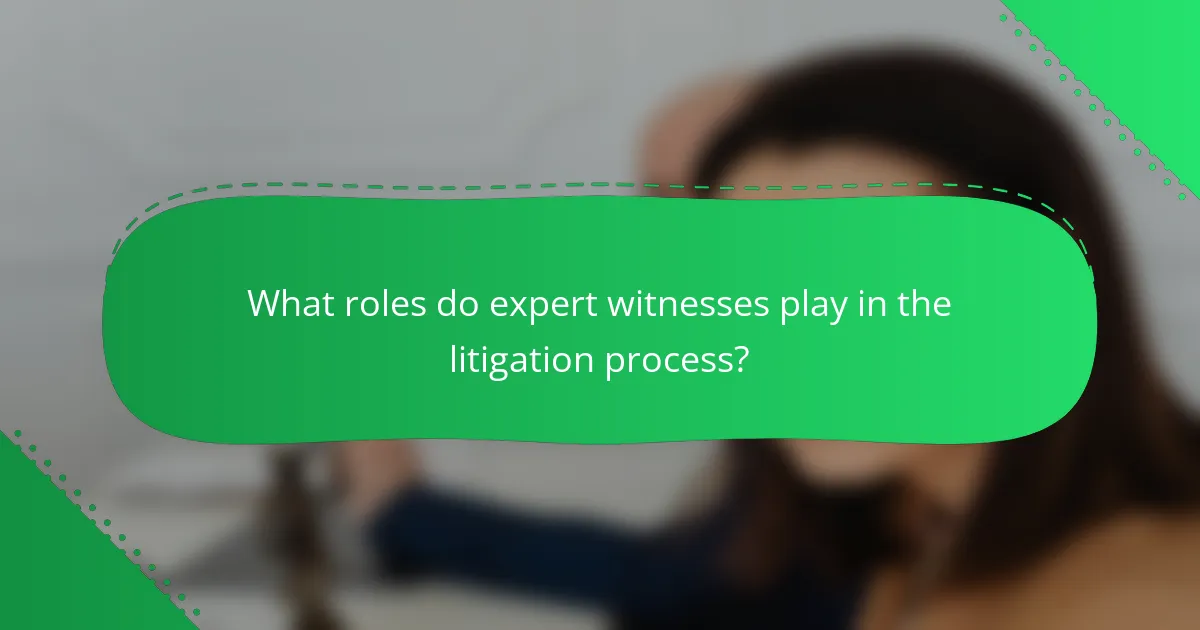
What roles do expert witnesses play in the litigation process?
Expert witnesses provide specialized knowledge to assist in legal cases. They analyze evidence and offer opinions based on their expertise. Their insights help clarify complex issues for judges and juries. Expert witnesses may also prepare reports and testify in court. They can influence case outcomes by lending credibility to arguments. Their involvement often involves reviewing case materials and consulting with attorneys. The credibility of an expert witness can significantly impact the litigation process. This role is essential in ensuring informed decision-making within the legal framework.
How do expert witnesses assist in case preparation?
Expert witnesses assist in case preparation by providing specialized knowledge and insights. They help attorneys understand complex subject matter relevant to the case. Expert witnesses can review evidence and identify critical information. Their analysis often clarifies technical details for legal teams. They may also prepare reports that summarize findings and opinions. These reports can be used to strengthen legal arguments. Additionally, expert witnesses may assist in developing case strategies. Their involvement can enhance the credibility of the case in court.
What types of reports do expert witnesses provide?
Expert witnesses provide several types of reports. These include comprehensive expert reports, which detail their findings and opinions on specific issues. They may also produce rebuttal reports, addressing opposing expert opinions. Additionally, expert witnesses can create preliminary reports, offering initial insights before formal analysis. Each report type serves a distinct purpose in litigation. Comprehensive reports often include methodologies, data analysis, and conclusions. Rebuttal reports counter specific claims made by other experts. Preliminary reports provide a snapshot of potential findings. These reports are critical for informing legal strategies and court decisions.
How do expert witnesses contribute to the development of legal strategy?
Expert witnesses contribute to the development of legal strategy by providing specialized knowledge and insights. They help attorneys understand complex technical issues relevant to the case. This understanding allows for better case assessment and strategy formulation. Expert witnesses can identify strengths and weaknesses in the opposing party’s arguments. They also assist in crafting effective questions for depositions and trials. Their testimony can enhance the credibility of a case. According to the American Bar Association, expert witnesses can significantly influence jury perceptions. This influence can lead to more favorable outcomes for the party that retains them.
What is the role of expert testimony during trial?
Expert testimony plays a crucial role in trials by providing specialized knowledge to assist the court. Experts clarify complex subjects that are beyond the understanding of the average juror. They help to establish facts and provide opinions based on their expertise. This testimony can influence the outcome of a case by lending credibility to arguments. For instance, in a medical malpractice trial, a doctor may explain standard practices and whether they were followed. Courts rely on expert testimony to ensure informed decision-making. The Federal Rules of Evidence emphasize the importance of expert testimony in helping juries understand evidence.
How do expert witnesses present their findings in court?
Expert witnesses present their findings in court through oral testimony and written reports. They explain complex information in a clear and concise manner. Visual aids, such as charts and graphs, are often used to enhance understanding. Expert witnesses may also respond to questions from attorneys during cross-examination. Their findings are typically based on research, experience, and analysis relevant to the case. Courts rely on their expertise to clarify technical details for the judge and jury. The credibility of expert witnesses is established through their qualifications and relevant experience. This process ensures that the jury can make informed decisions based on expert insights.
What impact does expert testimony have on jury decision-making?
Expert testimony significantly influences jury decision-making. Jurors often rely on expert witnesses to clarify complex information. This testimony can shape their understanding of technical evidence. Studies show that jurors are more likely to favor cases supported by credible expert opinions. For instance, a study by the National Center for State Courts found that jurors’ perceptions of credibility increase with expert testimony. Additionally, expert witnesses can help jurors evaluate the reliability of evidence. Their specialized knowledge can bridge gaps in jurors’ understanding. Overall, expert testimony plays a crucial role in guiding jury conclusions.
What ethical considerations must expert witnesses uphold?
Expert witnesses must uphold integrity, objectivity, and confidentiality. They should provide unbiased opinions based on their expertise. Expert witnesses must avoid conflicts of interest that could compromise their testimony. They are obligated to disclose any potential biases to the court. Additionally, they must adhere to the relevant legal and ethical standards in their field. Maintaining professionalism and accuracy in their reports is crucial. Expert witnesses also have a duty to educate the court without oversimplifying complex information. These ethical considerations ensure the reliability and credibility of their testimony in legal proceedings.
How do conflicts of interest affect an expert witness’s testimony?
Conflicts of interest can significantly undermine an expert witness’s testimony. When an expert has a personal or financial stake in the outcome of a case, their objectivity may be compromised. This can lead to biased opinions that favor one party over another. Research indicates that juries may perceive testimony from conflicted experts as less credible. Studies show that perceived bias can influence juror decision-making. For instance, a survey by the American Psychological Association found that jurors are more likely to disregard testimony from experts with disclosed conflicts. This highlights the importance of transparency in expert witness roles. Ultimately, conflicts of interest can diminish the reliability of expert testimony in legal proceedings.
What responsibilities do expert witnesses have regarding impartiality?
Expert witnesses have a responsibility to maintain impartiality throughout legal proceedings. They must provide objective opinions based on their expertise. This means not favoring either party in a case. Impartiality ensures that their testimony is credible and reliable. Courts rely on expert witnesses to present facts, not personal biases. Maintaining neutrality supports the integrity of the judicial process. Failure to be impartial can lead to discrediting their testimony. Ethical guidelines for expert witnesses emphasize the importance of objectivity in their assessments.
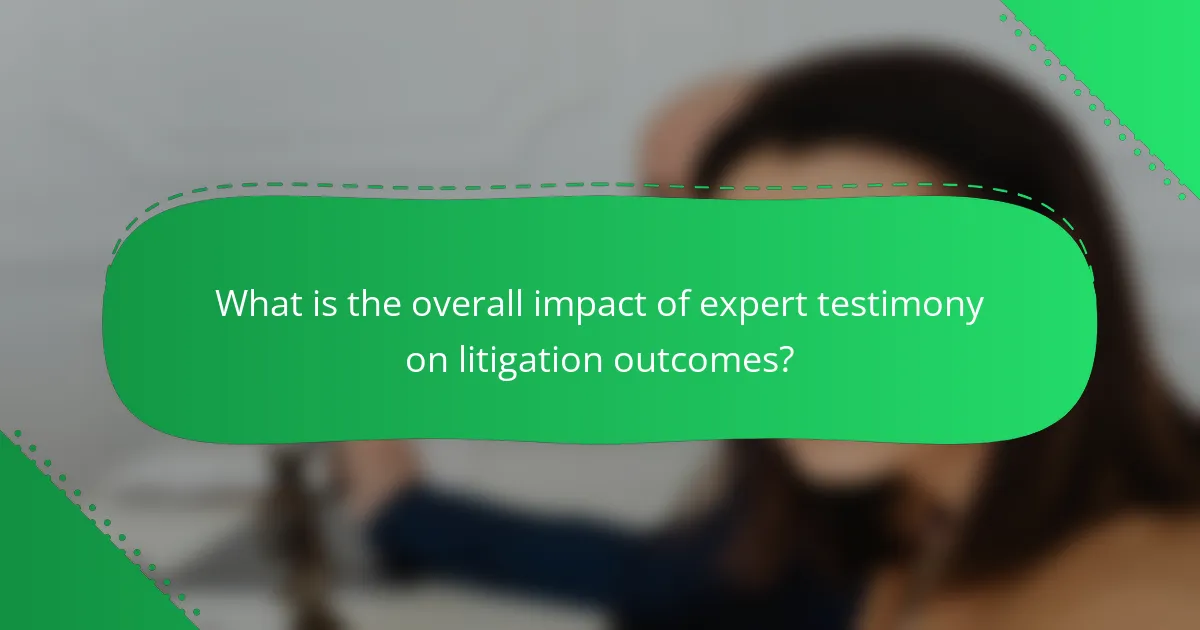
What is the overall impact of expert testimony on litigation outcomes?
Expert testimony significantly influences litigation outcomes. It provides specialized knowledge that helps clarify complex issues for judges and juries. Research shows that cases with expert testimony have higher chances of favorable verdicts. For instance, a study by the National Center for State Courts found that expert witnesses can increase the likelihood of winning a case by up to 30%. Additionally, expert testimony can shape the perception of credibility and reliability of evidence presented. This impact is particularly evident in technical fields such as medicine and engineering, where expert insights are crucial for understanding the context. Overall, expert testimony serves as a vital tool in guiding legal decisions and influencing jury perceptions.
How does expert testimony influence case results?
Expert testimony significantly influences case results by providing specialized knowledge to the court. This knowledge helps judges and juries understand complex issues. Expert witnesses clarify technical details that may be crucial for decision-making. Their opinions can bolster the credibility of a party’s argument. Studies show that cases with expert testimony often have higher success rates. For example, a study by the American Bar Association found that expert testimony increases the likelihood of favorable verdicts. Furthermore, juries tend to trust well-qualified experts. The qualifications of the expert can affect the weight given to their testimony. Overall, expert testimony plays a critical role in shaping the outcome of legal proceedings.
What statistical data supports the effectiveness of expert testimony?
Statistical data indicates that expert testimony significantly influences jury decisions. A study by the American Bar Association found that juries are more likely to accept expert opinions. Specifically, 75% of jurors reported that expert testimony was critical in their verdicts. Furthermore, research published in the Journal of Forensic Sciences showed that cases with expert witnesses had a 40% higher chance of favorable outcomes for the presenting party. These statistics underscore the persuasive power of expert testimony in litigation.
What are common challenges faced by expert witnesses?
Expert witnesses face several common challenges in their roles. One significant challenge is the need to communicate complex information clearly. Legal professionals may not have expertise in the witness’s field. This can lead to misunderstandings or misinterpretations of the evidence presented.
Another challenge is maintaining objectivity. Expert witnesses must provide impartial opinions, even when they are retained by one party. This can create pressure to align with the interests of the hiring attorney.
Time constraints also pose a challenge. Expert witnesses often have limited time to prepare their testimonies. This can affect the thoroughness and quality of their analysis.
Additionally, experts may encounter difficulties during cross-examination. Opposing counsel often seeks to discredit their testimony. This can create a stressful environment for the witness.
Lastly, expert witnesses face the challenge of staying updated in their field. Rapid advancements in technology and methodologies require continuous learning. Failure to stay current can undermine their credibility.
How can expert witnesses effectively prepare for cross-examination?
Expert witnesses can effectively prepare for cross-examination by thoroughly reviewing their own reports and relevant case materials. They should anticipate potential questions and challenges to their credibility. Practicing responses with legal counsel helps refine their answers. Understanding the opposing counsel’s strategy is also crucial. This preparation allows expert witnesses to remain composed under pressure. Studies indicate that well-prepared witnesses perform better during cross-examination. The American Bar Association emphasizes the importance of preparation in maintaining an expert’s reliability.
What strategies can experts use to communicate complex information clearly?
Experts can use several strategies to communicate complex information clearly. They can simplify language by avoiding jargon. This makes the content more accessible to a broader audience. Visual aids, such as charts and graphs, can help illustrate complex concepts. These tools provide visual representation that aids understanding. Experts should also use analogies to relate unfamiliar concepts to familiar ones. This technique bridges the gap between complex ideas and everyday experiences. Additionally, structuring information logically enhances clarity. Presenting information in a clear sequence allows audiences to follow along easily. Experts can summarize key points at the end of their communication. This reinforces the main ideas and ensures retention. Engaging the audience by inviting questions can clarify misunderstandings. This interactive approach fosters a two-way dialogue. Lastly, practicing active listening helps experts address specific concerns. This responsiveness enhances the overall communication effectiveness.
What best practices should be followed when utilizing expert testimony?
Utilizing expert testimony requires adherence to several best practices. First, select experts with relevant qualifications and experience. Their background should align with the subject matter of the case. Next, ensure that the expert can communicate complex information clearly. This clarity is crucial for understanding by judges and juries.
It is also important to prepare the expert thoroughly. This preparation includes reviewing case materials and formulating potential questions. Additionally, maintain open lines of communication with the expert throughout the process. This fosters a collaborative environment and enhances the quality of testimony.
Lastly, anticipate and address potential challenges to the expert’s credibility. This can involve preemptively gathering supporting evidence for their qualifications. Following these practices can significantly enhance the effectiveness of expert testimony in litigation.
Expert testimony in litigation support services refers to specialized opinions provided by qualified individuals in legal cases, which can clarify complex subjects for judges and juries. This article outlines the key qualifications required for expert witnesses, including advanced degrees and relevant experience, and discusses their critical roles in case preparation and trial processes. It highlights how expert testimony differs from other evidence types, its impact on litigation outcomes, and best practices for utilizing expert insights effectively in court. Additionally, the article addresses the ethical considerations and challenges faced by expert witnesses, emphasizing the importance of credibility and impartiality in their contributions to the legal process.

